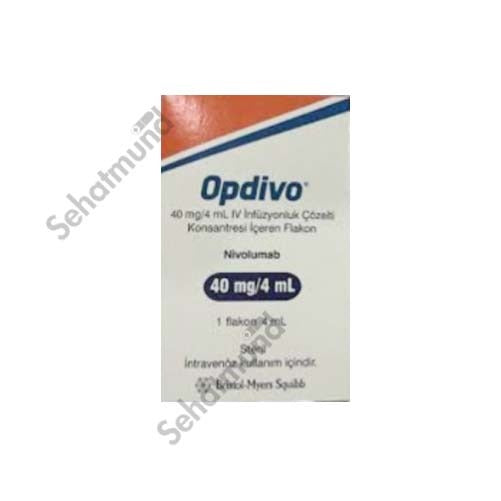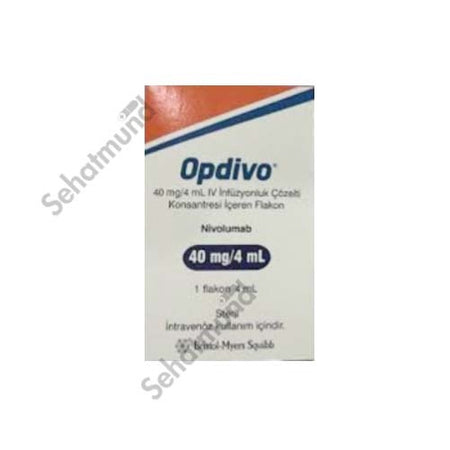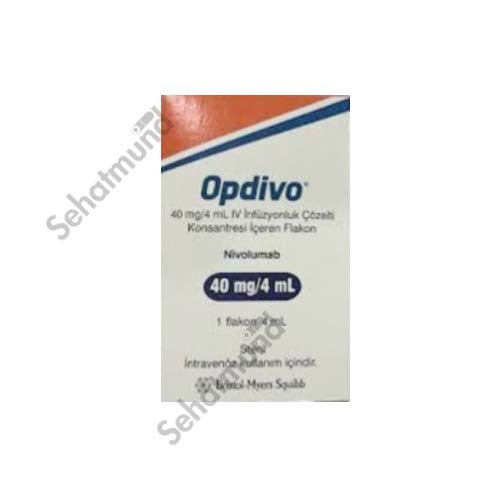Opdivo Injection 40ml
Couldn't load pickup availability
You can promote by sharing on social networks on the links.
Product Description
Product Name: Opdivo Injection 40ml
Product Form: Injection
Pack Size: 40ml
Manufactured By: Bristol Myers Squibb
Used For:
Nivolumab is used to treat several types of cancer, often as part of a combination therapy with other medications. Some of the cancers it is used to treat include:
-
Non-Small Cell Lung Cancer (NSCLC):
- Used for advanced or metastatic non-small cell lung cancer, often when other treatments have failed. Nivolumab can be used alone or in combination with other chemotherapy agents.
-
Melanoma:
- For advanced melanoma, nivolumab is used either alone or in combination with ipilimumab (another immunotherapy drug) to improve survival rates and reduce the risk of recurrence.
-
Renal Cell Carcinoma (RCC):
- Nivolumab is used in the treatment of advanced kidney cancer (renal cell carcinoma), often in combination with ipilimumab or other therapies.
-
Head and Neck Squamous Cell Carcinoma (HNSCC):
- For advanced head and neck cancer, nivolumab is used in patients whose cancer has spread or recurred after previous treatment.
-
Classical Hodgkin Lymphoma:
- Nivolumab is used to treat relapsed or refractory classical Hodgkin lymphoma in patients who have received prior treatments.
-
Urothelial Carcinoma:
- Nivolumab is used for advanced bladder cancer or urothelial carcinoma that has spread or recurred after other treatments.
-
Other Cancers:
- It is also used for other cancers, such as hepatocellular carcinoma (liver cancer), esophageal cancer, and more, depending on the specific treatment protocols.
Side Effects:
-
Common Side Effects:
- Fatigue
- Rash
- Nausea
- Diarrhea
- Loss of appetite
- Joint pain
- Cough
- Shortness of breath
- Fever
-
Serious Side Effects:
-
Immune-related side effects: Since nivolumab boosts the immune system, it can cause the immune system to attack normal, healthy cells, leading to inflammation and damage in various organs. Common organs affected include:
- Lungs (pneumonitis)
- Liver (hepatitis)
- Colitis (inflammation of the colon)
- Endocrine glands (e.g., thyroiditis, adrenalitis, diabetes)
- Skin (rashes or dermatitis)
- Severe infections: Increased risk of infections due to immune system activation.
- Nephritis (kidney inflammation), which can affect kidney function.
-
Immune-related side effects: Since nivolumab boosts the immune system, it can cause the immune system to attack normal, healthy cells, leading to inflammation and damage in various organs. Common organs affected include:
-
Long-Term Risks:
- Autoimmune reactions: Prolonged use of nivolumab can lead to chronic autoimmune conditions, where the body’s immune system mistakenly attacks healthy tissues.
Precautions:
-
Immune-related Adverse Events:
- Patients receiving nivolumab need to be monitored closely for signs of immune-related side effects. Any new or worsening symptoms should be reported to a healthcare provider promptly.
-
Pre-existing Conditions:
- Nivolumab should be used cautiously in patients with pre-existing autoimmune diseases (like rheumatoid arthritis, lupus, etc.) because it can worsen these conditions.
-
Pregnancy and Breastfeeding:
- Nivolumab is classified as Category D for pregnancy, meaning it may harm the fetus. It should be avoided during pregnancy unless the benefits outweigh the risks.
- It is unknown if nivolumab passes into breast milk, so breastfeeding should be avoided during treatment.
-
Liver and Kidney Function:
- Liver and kidney function should be monitored, as nivolumab can cause hepatitis and nephritis.
-
Infections:
- As nivolumab can weaken the immune system in some ways, patients should be carefully monitored for signs of infection during treatment.



